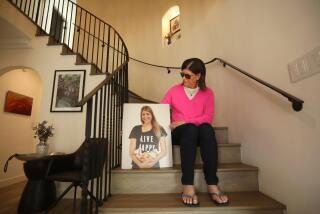Life interrupted
- Share via
In the novel “Unless,” a mother’s eldest daughter turns up as a homeless person on the streets of Toronto, wearing a sign that says “Goodness” around her neck. Like the fictional daughter, Carol Shields left her cozy world in 1998 when she was diagnosed with breast cancer at 63.
And like the woe-struck mother in that novel, Shields had to learn to keep on living in the face of sorrow. When the mother confesses, “It happens that I am going through a period of great unhappiness and loss just now,” it is very clear that Shields is talking of life after her diagnosis.
When I began writing a book aimed at husbands of breast cancer patients, I interviewed the Pulitzer Prize-winning novelist by phone early in 2003, just months before her death.
“I have a bit of a cough,” she warned. “So if I interrupt myself, you’ll understand.”
Shields gave of herself freely. Speaking as calmly as if she were discussing her spring garden, she shared a bit of the life she led in her five-year battle with breast cancer. She reflected on her accomplishments: five grown children, grandchildren and, as she noted with delightful understatement, “I had written some books.” Yet she was “devastated that my life was going to be shorter than I planned.”
To those who love her books, it may come as no surprise that the simple pleasures celebrated in their pages also took on new importance in the Shields’ lives. Her husband, Don, planned activities for her to look forward to -- a dinner or lunch at a restaurant, for instance. Both reading and writing -- she completed the novel “Unless” after her diagnosis -- also were vital acts. “I get strength from literature and from keeping interested in the news,” she said. “That’s the big thing -- to stay interested.” As she grew too weak to sit at the computer for long spells, she collaborated with one of her daughters on a play. “I needed the skills of a temp,” Shields said. “[My daughter] was so much better -- she could read my mind and I could read hers in a way.”
Then our conversation was interrupted, as Carol had warned. She coughed -- a horrible, hacking cough. She had been trying an experimental chemotherapy to improve her liver function, with good results, but the side effects were dreadful. The drugs altered her appearance and made it difficult for her to think. So she chose to stop the treatment, even if the drugs were the only thing keeping her alive.
“I’m much closer now,” she said as our conversation came to an end. I understood what she meant. “I realize time is running out.” Yet she was writing letters to leave behind -- “not exactly instructions,” she said, “but some things that I want to go a certain way afterward.”
In spite of it all, Shields was still looking forward to another collaboration with her daughter. The writing life provided hope where medical science could not.
“Having a project, something I’m involved with, has always been my recourse, “ she explained.
Her ability to remain optimistic and forward-looking was a mystery to her and is a lesson for us all. “I don’t know how we’ve managed, to be honest, to hold onto our generally good spirits,” she said. “But we have. We have.” *
More to Read
Sign up for our Book Club newsletter
Get the latest news, events and more from the Los Angeles Times Book Club, and help us get L.A. reading and talking.
You may occasionally receive promotional content from the Los Angeles Times.








